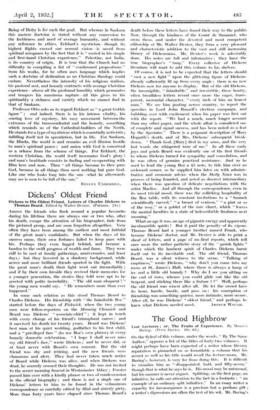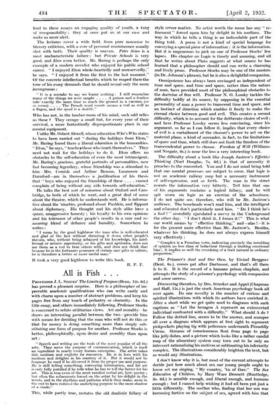The Good Highbrow
Lost Lectures ; or, The Fruits of Experience. By ;Mami,/ Baring. (Peter Davies. 10s. 6d.) ON the flyleaf of this volume, under the words, " By The Same Author," appears a list of the titles of forty-two volumes. It might perhaps have been expected of a writer whose literary reputat' is pinnaeled on so formidable a column that his accent as well as his title would meall the lecture-room. Mr. Baring's, however, is very far from doing this. It is difficult. to visualize him as " disappointed, bald, and fifty-seven," though that is what he says he is. His niood may be autumnal, but his manner is never august. Splitting, on the first page, an infinitive, he calls our attention to the fact in a footnote : " an example of an ordinary split infinitive." In an essay writer a capacity for inconsequence is a precious but a perilous gift ; a writer's digressions are often the test of his wit. Mr. 13aring's
lend to these essays an engaging quality of youth, a tang of irresponsibility ; they at once put us at our case and make us more alert.
The lectures cover a wide field, from pure nonsense to literary criticism, with a core of personal reminiscence usually shot with both. Their quality is uneven. Peter Sims is a most uncharacteristic failure ; but Private Schools is very good, and Eton even better. Mr. Baring is perhaps the only example of a modern novelist who enjoyed his public school career. " I enjoyed Eton whole-heartedly and unreservedly," he says. " I enjoyed it from the first to the last moment." Of the concrete intellectual benefits whets he reaped there the tone of his essay demands that he should reveal only the more incongruous :
" It is a mistake to say we learnt nothing t I still remember many of the things we were taught A guinea and a feather take exactly, the same time to reach the ground in a- vacuum (or ale vaeue).. . . . The French word candle means a teal as well as a flagon, and the spool is a shuttle."
Who has not, in the lumber-mom of Isis mind, such odd relies as these ? They occupy a small but, for every year of their survival, a more fantastically disproportionate place in our mental equipment.
Unlike Mr. Osbert Sitwell, whose education Ifho's Who states to have been carried out " during the holidays from Eton," Mr. Baring found there a liberal education in the humanities. "Eton," he says, " teaches those who teach themselves." They need not wait for the holidays to do it. Eton offers no obstacles to the self-education of even the most intransigent. Mr. Baring's gracious, grateful portraits of personalities, now fast becoming legendary, whose friendship was a stimulant to him—Mrs. Cornish and Arthur Benson. Luxmoore and Durnford—are in themselves a justification of his thesis that " boys who enjoyed the friendship of these . . . . cannot complain of being without any aids towards self-education."
He talks the best sort of nonsense about Oxford and Cam- bridge, to both of which he went, and a great deal of sense about the theatre, which he understands well. He is informa- tive about the 'nineties, profound about Pushkin, and flippant about diplomacy. His thought and his style alike have a queer, unaggressive honesty ; his loyalty to his own opinions and his tolerance of other people's results in a rare and re- assuring blend of defiance and humility. Somewhere lie writes : "I mean by the good highbrow the man who is-well-educated and glad of the fact without thrusting it down other people's throats, who, without being ashamed of his knowledge, his tate]. tactual or artistic superiority, or his gifts and aptitudes, does not use them as a rod to beat others with, and dues not think that because he is the fortunate possessor of certain rare gifts or talents, he is therefore a better or more useful mall."
It took a very good highbrow to write this book. II. P. F.

































 Previous page
Previous page